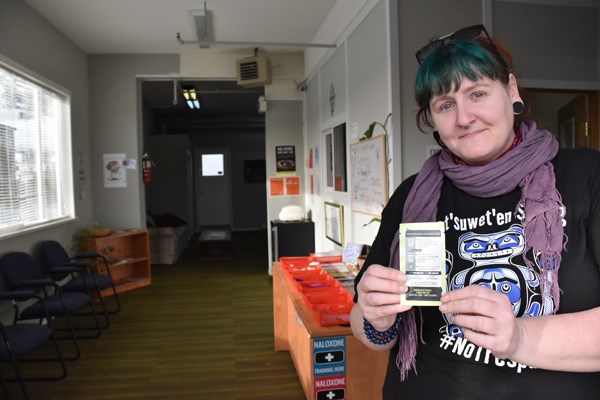You’d probably miss it if it weren’t for the sign, but the fact that it’s here is a sign of the times.
Since November, the Sunshine Coast’s only harm reduction centre has been operating in a nondescript building on Wharf Avenue in Sechelt, beneath the shelter operated by RainCity Housing.
“We’re a drug user group, and a safe space and [offer] harm reduction services, and all of it kind of wrapped up,” said Hawkfeather Peterson, an outreach worker with Vancouver Coastal Health (VCH) who manages Sunshine Coast Connections.
Approximately 100 people have sought its services so far; between 30 and 40 of them use the space regularly. Some walk in after work, still wearing steel-toed boots and dusted with drywall. “They come in and they say, ‘Until you were here I wasn’t getting anything. I was re-using for months.’”
The space also offers various programs, including a grief support group for families and friends of people who have died from an overdose.
A report released in July 2019 found that Powell River and the Sunshine Coast are “disproportionately affected” by the opioid overdose crisis. In 2019 there were 24 overdose deaths in the North Shore/Coast Garibaldi region, which includes the Sunshine Coast.
Connections was launched to make it easier for people who use drugs to access clean syringes, tourniquets and meth pipes, as well as the opioid overdose reversing agent naloxone and drug checking strips, among other harm reduction supplies. The need was identified by the Community Action Team (CAT) – a provincially funded group of peers, politicians, health care and service providers, and first responders, whose mandate is to reduce the risk of overdose on the Sunshine Coast.
Rent is covered by the Overdose Emergency Response Centre and two provincial grants totalling $30,000 cover peer volunteer stipends and other operating costs. The lease for Connections is up for renewal in April but the intention, according to a CAT spokesperson, is for Connections to remain in that space.
The BC Centre for Disease Control describes harm reduction as “a crucial strategy to prevent blood-borne infections, address overdoses, and increase access to supplies to improve social/economic circumstances.” However, stigma and discrimination against people who use drugs can often act as barriers to accessing health and social services.
That’s where Connections comes in.
On a table close to the entrance rests a neat line of red baskets filled with an assortment of harm reduction supplies. “They can come in here and not bump into people and not have to tell people their whole story or even admit they’re substance users. They can just pick up stuff and go,” said Peterson, who describes Connections as the only low-barrier location on the Sunshine Coast.
A small fridge and stove is used to cook meals. There’s a couch and comfortable chairs and a closed office where people can discuss private matters. A simple message is written on the whiteboard in the main room: “U R Loved.”
The design of the space is intended to create opportunities for people to interact, including with outreach workers and volunteers with experience using drugs who can direct people to services, including detox, or educate them about safer substance use. Peer outreach is considered best practice by the Canadian Centre on Substance Use and Addiction, since peers can “establish trust and help people sustain positive changes.”
One peer volunteer told Coast Reporter Connections has been a source of positivity for him after knee surgery led to an opioid addiction. He has tried treatment but admits he isn’t ready to try again. “This place will help me a lot, if I let it,” he said.
Community members have donated most of the items in the space, including blankets, clothes and food, but Peterson said stigma remains a problem on the Sunshine Coast, and that includes how drug users see themselves.
“What’s creating barriers to accessing care is stigma, and if we can help take apart that internalized stigma and help them see they’re good people that deserve health care and deserve to be safe and not die in their bathrooms horribly … it shifts things for them,” she said.
“I’ve seen people who have been entrenched users for 20 or 30 years coming in and just being treated with some basic human kindness. They shift what they want to do and how they want to take care of themselves.”
Connections is open from 2 p.m. to 7 p.m. on weekdays and from 5 p.m. to 10 p.m. on Saturdays.
– With files from Sean Eckford



